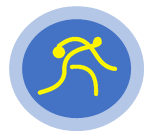 include cooperative skills; appropriate body language; self-awareness skills
include cooperative skills; appropriate body language; self-awareness skills
The Expanded Core Curriculum
Promoting student success beyond the core curriculum.
Nine essential skill areas directly impacted by blindness and visual impairment. Students require specialized tools and strategies delivered through direct instruction and collaborative support from a qualified Teacher of Students with Visual Impairments.

Social Interaction Skills

Recreation and Leisure Skills
 include motor skills; using adaptive sports equipment; developing hobbies.
include motor skills; using adaptive sports equipment; developing hobbies.

Sensory Efficiency Skills
 include active listening strategies; use of low vision devices; multi-sensory exploration.
include active listening strategies; use of low vision devices; multi-sensory exploration.

Compensatory Skills
 include listening and speaking skills; problem-solving skills; using tactile markers and labels.
include listening and speaking skills; problem-solving skills; using tactile markers and labels.

Access Technology Skills
 include keyboarding skills; using screen reading software; maintaining devices.
include keyboarding skills; using screen reading software; maintaining devices.

Orientation and Mobility Skills
 include spatial and body awareness; using public transportation; intersection analysis.
include spatial and body awareness; using public transportation; intersection analysis.

Self-Determination Skills
 include self-advocacy; decision-making skills; understanding accessibility rights.
include self-advocacy; decision-making skills; understanding accessibility rights.

Independent Living Skills
 include personal management skills; home management skills; preparing meals.
include personal management skills; home management skills; preparing meals.

Career and Vocational Skills
 include time management skills; work habits; post-graduation planning.
include time management skills; work habits; post-graduation planning.